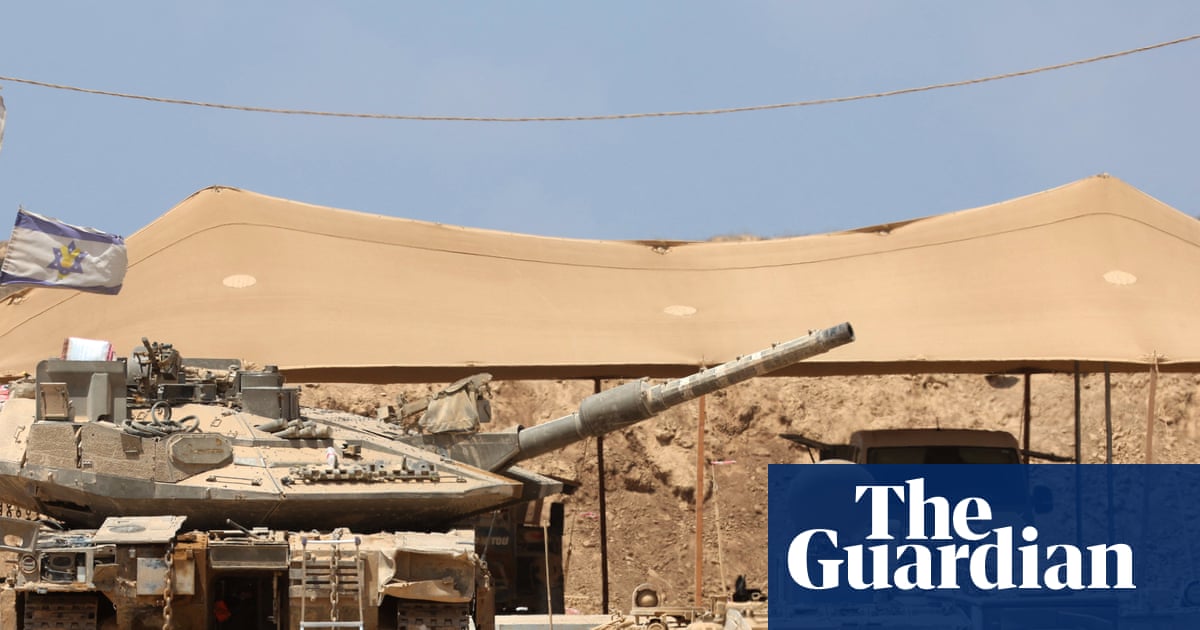An Israeli operation to conquer Gaza City would be a “death sentence” for the remaining living Israeli hostages held in Gaza, relatives of the hostages have said, as the Red Cross and UN warned of a looming catastrophe.
Opposition to a new operation – repeatedly “approved” by Israeli figures in recent days – is growing inside Israel and internationally. Calling for an immediate ceasefire, the UN secretary general, António Guterres, warned of the “massive death and destruction that a military operation against Gaza would inevitably cause”.
Christian Cardon, the chief spokesperson for the International Committee of the Red Cross (ICRC), said: “The intensification of hostilities in Gaza means more killing, more displacement, more destruction and more panic. Gaza is a closed space, from which nobody can escape … and where access to health care, food and safe water is dwindling. Meanwhile, the security of humanitarians is getting worse by the hour. This is intolerable.”
On Thursday, the IDF said medical officials and aid groups in the northern part of the territory had been told “to prepare for the population’s movement to the southern Gaza Strip”.
Aid organisations say Israel has made negligible efforts to significantly increase humanitarian assistance to Gaza to the levels needed by the population, prompting a warning from the French president, Emmanuel Macron, of the danger of a “true disaster”.
The families of Israeli hostages held a press conference to call for Israel to agree to a ceasefire deal – already accepted by Hamas and Palestinian Islamic Jihad – which would result in half of the remaining 20 surviving hostages being released.
“We’re a step away from a total torpedoing” of a deal, said Lishay Miran Lavi, whose husband, Omri, is thought to still be alive in captivity. “There is an agreement on the table that could save the lives of hostages and return the dead for proper burial.
“Hamas has agreed, but the prime minister’s office is working to sabotage it, which would sentence the living hostages to death and the dead to disappearance … The public demands the return of the hostages and an end to the war, which has lost all sense. You cannot conduct a 22-month war whose sole purpose is to preserve political power.”
Representatives from hostage families referred sceptically to the Israeli prime minister Benjamin Netanyahu’s repeated promises that Israel is close to victory.
Israel’s increasing defiance of international opinion has pushed it ever closer to the status of a pariah state, both for the destruction and mass starvation it has visited on Gaza in almost two years of war, and for its approval on Wednesday of a massive illegal settlement aimed at destroying any possibility of a future Palestinian state. The approval was described by the British foreign secretary, David Lammy, as a “flagrant breach” of international law.
Netanyahu’s plans for a major new offensive have prompted large-scale demonstrations in Israel. About 400,000 joined a protest on Sunday and more demonstrations are planned for this weekend.
A weakened Netanyahu appears to have bent to the demands of far-right minority parties in his fragile coalition who have called for the conquest of Gaza and threatened to collapse the government in the event of a ceasefire deal.
The Israeli military bombarded Gaza City overnight, a day after it was announced that 60,000 reservists were being called up. A military official said most reservists would not serve in combat, giving strength to the argument that at least some of Israel’s recent statements amount to posturing against the background of complex and continuing ceasefire talks.
Calling up tens of thousands of reservists is likely to take weeks, giving time for mediators to attempt to bridge gaps over a new temporary ceasefire proposal that Hamas has accepted, but the Israeli government is yet to officially respond to.
That proposal, which aligns with an outline drawn up by the US president Donald Trump’s special envoy, Steve Witkoff, calls for a 60-day ceasefire and the release of 10 living hostages being held in Gaza by Hamas militants and of 18 bodies. In turn, Israel would release about 200 long-serving Palestinian prisoners.
Significantly, Israel had signalled weeks ago that it accepted that outline for a deal, with the distance between Hamas and Israel’s negotiators only closing since.
Netanyahu is scheduled to meet some cabinet ministers on Thursday to discuss his plan to seize Gaza City, according to Haaretz and other Israeli media outlets, without giving more details.
The plan was approved this month by the security cabinet, which he chairs, even though many of Israel’s closest allies have urged the government to reconsider.
In Gaza City, thousands of Palestinians have left their homes as Israeli forces have escalated shelling on the Sabra and Tuffah neighbourhoods. Some families have left for shelters along the coast, while others have moved to central and southern parts of the territory, according to local people there.
“We are facing a bitter-bitter situation, to die at home or leave and die somewhere else: as long as this war continues, survival is uncertain,” said Rabah Abu Elias, 67, a father of seven.
“In the news, they speak about a possible truce; on the ground, we only hear explosions and see deaths. To leave Gaza City or not isn’t an easy decision to make,” he told Reuters by phone.
